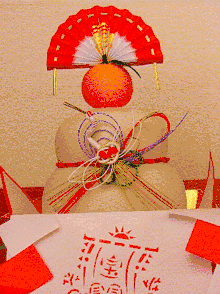Kagami biraki

Kagami Biraki (鏡開き) is a Japanese traditional ceremony which literally translates to "Opening the Mirror" (from an abstinence) or, also, "Breaking of the Mochi." It traditionally falls on January 11 (odd numbers are associated with being good luck in Japan) It refers to the opening of a Kagami mochi, or to the opening of a cask of Sake at a party or ceremony.
History
The fourth Tokugawa Shogun was the first to hold this ceremony 300 years ago. On the eve of war, he gathered his daimyo in his castle to break open a sake cask. Upon achieving victory, a new tradition was born.
Ceremony
The ceremony nowadays is also performed at weddings, sporting events, opening days at new companies, and other significant events worthy of being celebrated.
In Japan, mochi was traditionally made at home, but most families today buy it ready-made. Over the holidays, a pair of round mochi (kagami mochi) the size of small plates -- one a little larger than the other -- is stacked on a stand and placed in a household Shinto or Buddhist altar or tokonoma as an offering to the deities that visit on New Year's. The ornamental mochi is removed on January 11 and broken into smaller pieces before being eaten.
By this time, the kagami mochi is usually quite brittle, and cracks appear on the surface. The mochi is not cut with a knife, since cutting has negative connotations (cutting off ties) and is instead broken with one's hands or a hammer.
Many Japanese martial arts dojo use the Kagami Biraki ceremony to signify their first practice of the New Year.
See also
- Breaking bread in Europe, particularly in the Christian Eucharist
References
- "Sake Barrel Ceremony:Kagami-biraki". Gekkeikan Sake. 2006.
